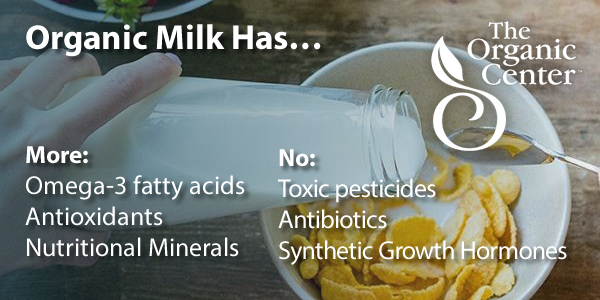Milk can help provide kids with the nutrients and vitamins they need to build strong bones and healthy muscles. But not all milk is created equal -- Organic milk has more of the good stuff and none of the toxic pesticides, antibiotics and synthetic hormones.
Organic cows are happier and healthier which leads to more nutritious milk and healthier kids! By choosing organic milk, you can get the nutritional benefits of milk without exposing your family to chemical contaminants.
Numerous studies have found that organic milk has a higher nutritional content, and even more healthy omega-3 fatty acids, and more disease-fighting antioxidants than non-organic milk. Organic cows are raised in humane conditions and eat healthy diets, so that your glass of organic milk can be served without antibiotics, synthetic growth hormones or toxic pesticides.

Why is the good stuff good?
Omega-3 Fatty Acids: Omega-3 and Omega-6 are essential fatty acids that we need to be healthy, but our bodies don’t produce them naturally, so we must obtain them through our diets. While both are important, there’s a healthy balance that must be achieved. Most Americans are getting too much omega-6 in their diets and too little omega-3.
Having too many omega-6 compared to omega-3 in your diet can lead to several common – and scary – diseases including cardiovascular disease, asthma, osteoporosis, breast cancer, prostate cancer and autoimmune disease. Drinking organic milk – high in omega-3 – can help balance the ratios of omega-3 and -6 and suppress these diseases!
Antioxidants and Nutritional Minerals: Organic milk has been found to have higher concentrations of nutritional minerals and antioxidants – like iron, vitamin E, selenium, and carotenoids – than non-organic milk. Foods that are high in antioxidants – like organic milk – help our bodies fight against free radicals that can cause oxidative damage in our cells that can contribute to coronary diseases and some cancers.
What about the bad stuff?
A recent study published in Public Health Nutrition shows that organic milk does NOT contain any residues of currently used pesticides or antibiotics, and has lower levels of growth hormones than conventional milk.
Toxic Pesticides: Chlorpyrifos, a pesticide used in conventional agriculture, was found in nearly 60% of non-organic milk samples. The pesticide is a neurotoxin associated with developmental issues in babies and children. Four of the conventional milk samples exceeded the FDA legal limit for the pesticide.
Antibiotics: Using antibiotics in agriculture can lead to antibiotic-resistant infections in animals that can be passed to humans. Many classes of antibiotics that are used in the human health system such as penicillin are also used in livestock production. If bacteria in livestock become resistant to the same antibiotics that we would use to fight them, we have little to no defense against many bacterial infections.
Organic dairy production relies heavily on holistic management of dairy cows, which raises the standard of living and promotes greater health in the livestock.
Synthetic Growth Hormones: While growth hormones are naturally produced by animals, the use of synthetic growth hormones has gained popularity in conventional dairy operations because they promote the production of milk. These hormones make their way into the milk we drink and can lead to changes in endocrine function which can affect our growth, brain development and reproductive capabilities.
Visit our ‘Press Room’ to learn more about the pesticides and antibiotics found in non-organic milk.

